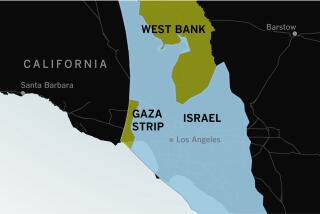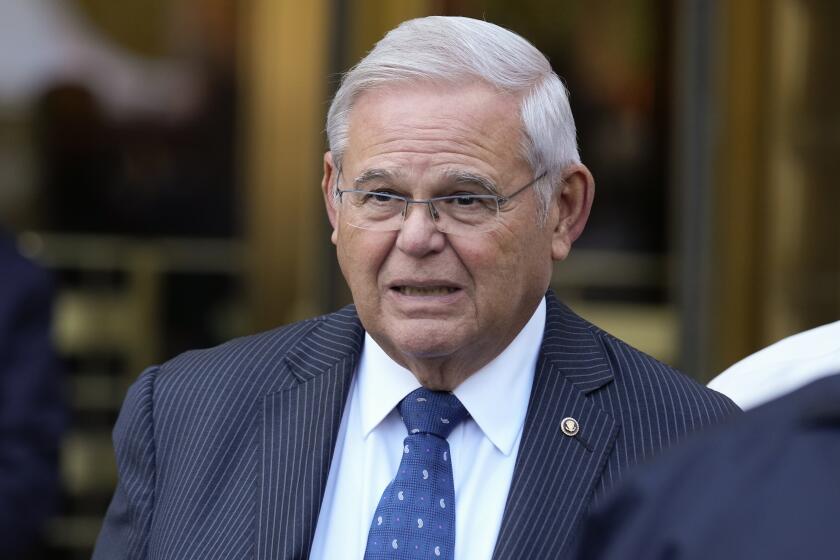COLUMN ONE : New Fears for Jews of Germany : To stay or leave, integrate or isolate. After years of leading a difficult double life, the children of Holocaust survivors face rising nationalism and the same questions that plagued their parents.
Kissing their parents goodby, hugging lunch boxes and notebooks, 300 Jewish children pour into the I.E. Lichtigfeld primary school each morning through an iron gate and electric doors with bomb-proof glass. Police patrol the streets around the school in the city’s lush West End neighborhood while video cameras monitor its hallways.
Inside, a few boys don yarmulkes and sit down with girls in ponytails for reading, writing and arithmetic, Hebrew and Judaism. Throughout their lessons, the children address the particular dilemma of being German and Jewish.
“In history classes, we speak of their families. They know their parents didn’t have any aunts and uncles or grandparents,” said Alexa Brum, director of Frankfurt’s only Jewish school.
“They also know that after a while they will have to go out to gymnasium (public high school),” she said. “We teach them that it is absolutely normal to be Jewish and that they should be proud--proud people who eventually have to decide if they want to integrate into this society or go elsewhere. Someday, they must make a decision.”
To stay or leave, integrate or isolate. These are the questions that plagued the Holocaust survivors who settled in Germany after the Nazi extermination of 6 million European Jews, and that once again weigh on their children and grandchildren who see a resurgence of anti-Semitism.
Frankfurt is one of the most ethnically diverse cities in Germany and is home to a quarter of the republic’s 40,000 Jews. But even here, Jews say they increasingly feel unwelcome in their own country and, occasionally, threatened.
Unified Germany is experiencing a growing sense of national pride that frightens many Jews for whom nationalism harkens back to the Third Reich. They see Europe’s most powerful country increasingly anxious that it will be diminished by European unity. And they watch a small but emboldened radical right finding resonance among Germans who seek someone to blame for their severe economic problems--including the highest unemployment since World War II.
In this climate, postwar taboos against racism and anti-Semitism are breaking down: In the last two years, Turkish immigrants have been killed in arson attacks by rightists in Moelln and Solingen; scores of Germans watched and applauded as arsonists set fire to a home for foreign asylum-seekers in Rostock, and only two weeks ago, a mob of rightists and hooligans attacked black Africans and destroyed a restaurant owned by Turks in Magdeburg.
Once-anonymous hate mail has been sent to Jewish leaders with unabashed signatures. And neo-Nazis fire-bombed the synagogue in Luebeck on the eve of Passover--the first such attack since the Nazis’ Kristallnacht rampage against Jews in 1938.
After the synagogue-burning, radical-rightist politician and former SS officer Franz Schoenhuber said Frankfurt’s Jewish leaders are to blame for anti-Semitism in Germany.
“The rats have come out of the holes,” Brum said. “There has always been anti-Semitism, but now they dare to say it out loud and dare to throw bombs.”
After the fatal attack in Solingen, sixth-graders at Frankfurt’s Jewish school bared their fears in essays about being German and Jewish.
“The Nazis want to take power over Germany,” wrote 12-year-old Michaela, a Frankfurt native. “They scribble on the walls ‘Jewish Pigs’ and similar things. Then I realize that I am in the wrong country. Germany belongs to the Germans, and Jews have nothing to do here.”
About half a million Jews lived in Germany before the Nazis were voted into power in 1933. Nine years later, the 30,000-member Jewish community in Frankfurt was officially decreed to have been eradicated. It had been a vibrant community of well-to-do German Jews who contributed financially and culturally to the city--bankers, industrialists and intellectuals from the so-called Frankfurt School of social scientists--and of Polish immigrants who provided craftsmen and laborers. Liberal Frankfurt even had a Jewish mayor.
“Jews were not just tolerated, they were accepted,” said Jewish author Valentin Senger. “They were a part of Frankfurt.”
Within a couple years, the Nazis turned the city against Jews, Gypsies and anyone who did not fit the Aryan ideal, and carted them off to concentration camps.
Senger’s apparently was the only Jewish family to survive the Third Reich in Frankfurt, passing as non-Jews and working in the Resistance.
After the war, the British and Americans set up displaced persons camps in Germany for survivors of Hitler’s concentration camps. One of them, Zeilsheim, provided the base for Frankfurt’s postwar Jewish community, which today numbers about 6,500.
Most of the settlers were merchants and craftsmen from small Jewish communities in Poland who never meant to remain in Germany.
They had children and reluctantly put down roots, reopening the synagogue, a community center, a home for the elderly, a school for their children. But they were always “sitting on packed bags” because they wished to leave or believed that one day they might have to leave. They wanted nothing to do with Germans, whom they considered immoral.
Thus, the children of survivors were raised in a Jewish ghetto of postwar Germany with all its contradictions.
Their youth organizations encouraged them to move to Israel. Their parents would not let them date Gentiles. But they went to German high schools, spoke German, held German passports. They were citizens of Germany exempted from military service as the offspring of Nazi victims.
“It was schizophrenic,” said David Lieberberg, managing director of the popular music department at Frankfurt’s Old Opera House. “My parents were always proud when I’d come home from school with A’s in German.” But the minute his sister was caught with a German boyfriend, she was sent away to Israel.
German friends at school knew little about Jews or the Holocaust.
“History lessons used to go through Germany, up to the Weimar Republic, then move over to Russia and come back to Germany after the war,” said Lieberberg, 46. “During religion lessons in school I had a free hour. Kids said, ‘What are you? A Jew? What’s that?’ They hadn’t heard.”
Largely Protestant and Roman Catholic Germany is a country with strict norms governing appearance and behavior.
Jews generally have different biblical names and darker complexions. They celebrate different religious holidays. And because of this, German-born Jews are frequently asked where they come from. In adolescence, many children of survivors began to challenge their parents: Why did you come to Germany? Why did you stay?
Their parents didn’t have answers. They had stayed because they had stayed.
Frankfurt Jews first emerged from isolation in the fall of 1985 in what became known internationally as the Fassbinder Affair. Reiner Werner Fassbinder’s play “Garbage, the City and Death” was to be staged at a local theater, and Frankfurt’s Jews were outraged by a work they judged to be anti-Semitic. On opening night, they occupied the stage and closed the play down.
For some, the public controversy marked the coming of age of the German Jewish community. For others, it was another way of hiding, of quieting public discussion. In either case, it marked the emergence of Jewish leaders who believed that Jews were in Germany to stay and must interact with the community at large.
“There must be a conscious, proud, independent Jewish life,” said Michel Friedman, 38, a spokesman for the Frankfurt Jewish community. “But Jewish life also has to be part of the common society, and there has to be a dialogue between Jews and non-Jews.”
In the last couple of years, Jewish leaders have taken political discussions about Jewish issues into public forums. They opened Jewish cultural events to non-Jews and routinely speak out against abuses of all minorities.
“I always fight for integration, not for assimilation,” said Ignatz Bubis, 66, a leader of the Frankfurt Jewish community and head of Germany’s Central Council of Jews.
Some Jews say they never suffered discrimination growing up in Germany. For decades after the war, anti-Semitism was taboo, buried or, in some cases, overcome. Many Jews felt anti-Semitism more strongly elsewhere, such as in Poland and France, while guilt-ridden Germans handled them with kid gloves.
To stay or leave, integrate or isolate. Younger Jews began to make peace with their German heritage and to accept that they belonged to two cultures. Their bags were unpacked--they meant to stay in Germany.
“I grew up here, went to school here, read German books, German is my mother tongue,” said Josse Reich, 31, the son of Holocaust survivors. “I make fun of the Germans. I imitate them very well because I am them.”
“What else could I be?” added Marc Gruenbaum, 24. “To live with conflict is not normal. You can’t always be thinking of leaving or you can’t concentrate on your life. When I define myself as German, I can fight for the Germany I’d like to have.”
And now is the time to fight, Gruenbaum said. Jews young and old see German society growing more conservative and rigid since the Berlin Wall was torn down and a daily reminder of Germany’s dark history disappeared. Increasingly, Germans say they want to put the past behind them, and the political shift is encouraging radical rightists to act on their anti-foreigner, anti-Semitic sentiments.
Extreme-right political parties are scoring poorly in election polls, however, and are looking for new issues, Jewish leaders note. With the tightening of asylum laws last year, they appear to be turning their attention from immigrants to Jews.
Bubis’ 30-year-old daughter, Naomi, says the radical right National Democratic Party sought permission to hold a rally outside the Jewish Community Center recently to protest excessive Jewish influence in German politics.
“This could never have happened before reunification. Before, they knew no one would support them. Now, they feel more sympathy (for their ideas) in the non-Jewish community,” she said, adding that the permit was denied and the rally never took place.
The memory of the Holocaust and current upsurge in anti-Semitism made it difficult for Frankfurt’s Jewish community to recruit a rabbi for their orthodox synagogue. There is no German rabbinical school, and there are no German rabbis. Frankfurt’s West End synagogue was without a rabbi for 2 1/2 years before members persuaded Rabbi Menachem Halevi Klein to come from Israel last fall.
“I am here only for religious reasons,” he said. “There are hundreds of kids who know nothing about Judaism, and that is my project. There are many Russians, and someone has to tell them that they are Jewish. There is kosher food.”
But he shook his head. “It is a very difficult feeling on this ground where so much Jewish blood was spilled. I don’t feel afraid, but I don’t feel good.”
At the Lichtigfeld school, children sing Jewish songs and celebrate their heritage unfazed by the tight security measures around them.
But director Brum notes that 400 Russian Jewish families that were supposed to emigrate to Frankfurt this year have not arrived. Many stayed in Russia or moved to Israel, fearing anti-Semitism in Germany.
Brum, meanwhile, bought a small summer house in France a couple of years ago that she says gives her family a sense of security--a place to go “if something happens” in Germany.
And many Jews born and raised in Frankfurt are beginning to ask themselves whether they should raise their children here.
“I don’t want my children to live in fear,” David Lieberberg said.
“I am German. I feel very German,” Josse Reich added. “But since having a daughter a year ago, I don’t know if I really want to stay now.”
More to Read
Start your day right
Sign up for Essential California for news, features and recommendations from the L.A. Times and beyond in your inbox six days a week.
You may occasionally receive promotional content from the Los Angeles Times.






